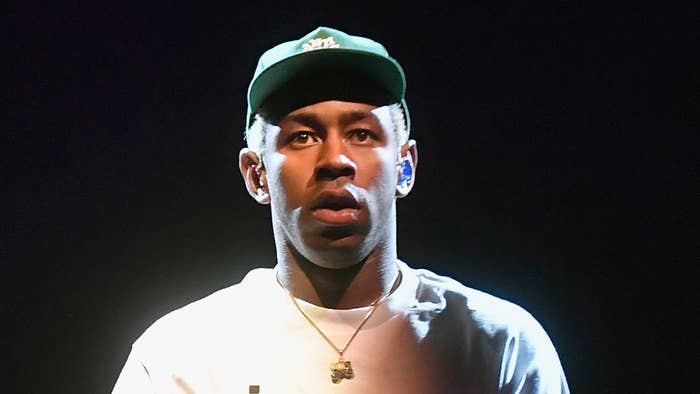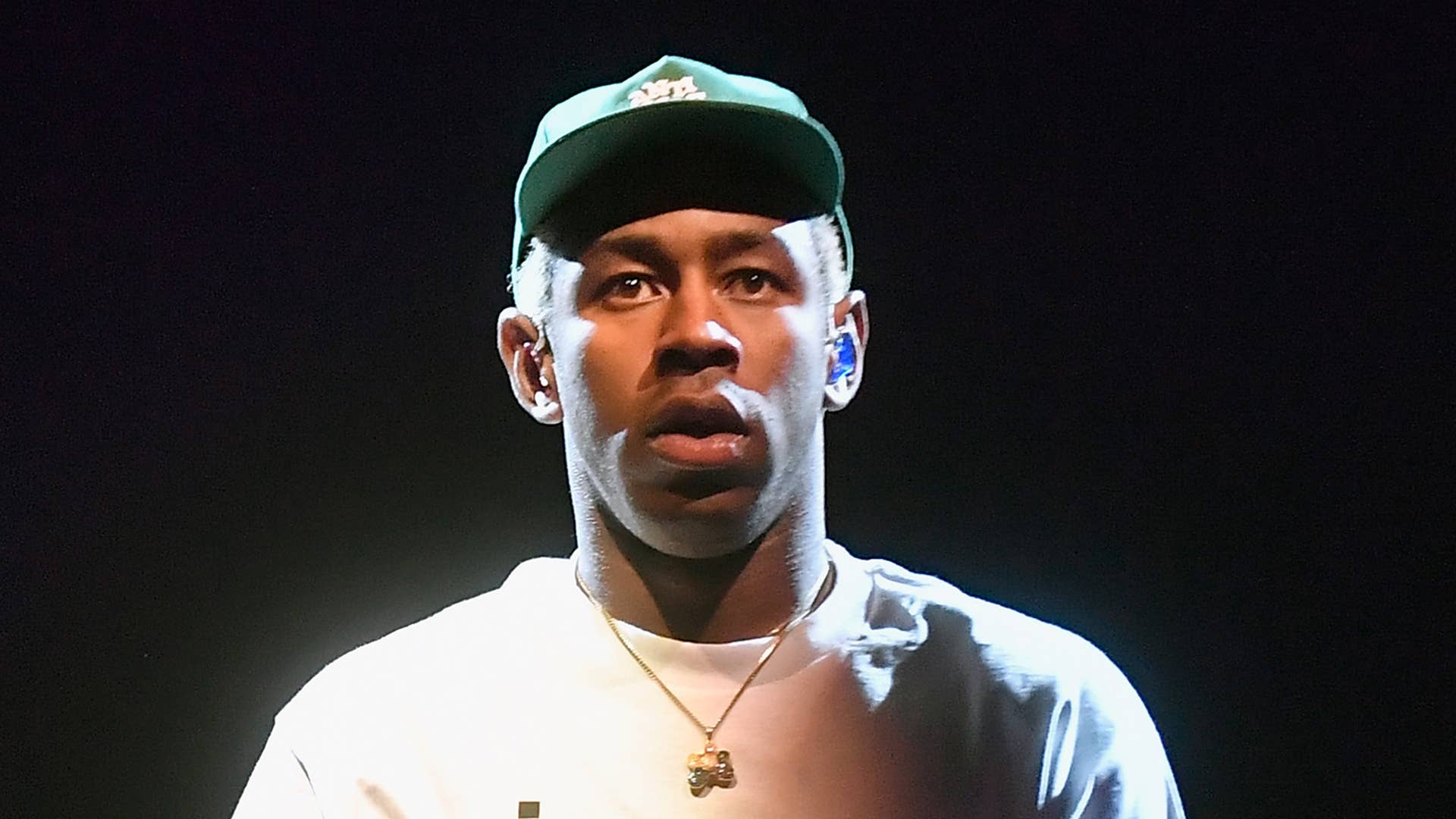
It was Christmas Day, 2009. Tyler Okonma uploaded his debut solo mixtape, Bastard, to the OFWGKTA Tumblr page, and those waiting for something since the November 2008 release of The Odd Future Tape tape finally had their prize. “Fuck Nah Right. Fuck 2DopeBoyz.” Reading the album description on the group’s archived website, it’s funny to think about everything that has transpired in Tyler, the Creator’s career since then.
“Tyler Creator (or Ace) Releases This Full Length Self Produced Album, Mostly About His Father, Rape, Box Logos And Jesus. Also Featuring Unicorns And Transexuals. Click The Title To Download.”
The egregious talk and violent imagery was a distraction. It worked. People mistook Tyler’s ability to shock and irritate as a style in and of itself. Throughout Bastard, Tyler proved himself to be a wildly talented MC. Just take a look at the first track, which is six minutes of piano, bars, and skits, but captivates like a Tom Cruise thriller. “I know you fucking feel me, I want to fucking kill me/But times I’m so serious you think I’m silly/I’m doing Big Style Willy couldn’t touch 11/Seven, what’s religion n***a? I am legend.” It’s knotty, dense, and takes multiple listens to unpack. And that’s just track one from his first mixtape.
Tyler has always had a fascinating relationship with the concept of rapping. He has long been a stellar rapper, but during the early part of his career, the word had an ugly ring in his ear. It suggested that he rapped over someone else’s beats, and that his range was limited to rhyme schemes and cadence. To have called Tyler a rapper was to, from his perspective, eliminate his other accomplishments and skills: he created Odd Future; he directed his own videos; he produced his own songs; he had ideas for television, film, and soundtrack work. Tyler was more than a rapper, so when people praised his skills as an MC, he sometimes viewed it as a willful neglect of his other talents.
Around 2014, right up to the run-up of Cherry Bomb, Tyler began talking about how he didn’t like rapping. More accurately, that he hated rapping. Here he is, on Larry King’s radio show, discussing the topic. “I hate rapping, only because it puts you in this box. I was scared for this interview, because me being a rapper, I was scared of the questions you’d maybe ask me. People look at you different. I don’t wanna rap anymore. I just want to compose music.” It’s easy to see how he followed through in this direction after IGOR, but at the time it was jarring. Cherry Bomb didn’t reflect this opinion as heavily as Flower Boy, which received glowing reviews despite it being somewhat of a left turn sonically. By moving further away from traditional rap, despite still being a quote-unquote rapper, Tyler expanded the scope of his own rap music, creating a new lane in which more experimental works could still be viewed through the lens of hip-hop.
When Tyler decided to rap on Flower Boy, it was with an intense specificity. It was the beginning of his―for lack of a better phrase―vibe period, in which feelings, textures, and the general atmosphere was granted as much importance as his words. When he did rap, the effects were superlative. “Who Dat Boy” gained the biggest crowd reaction throughout his IGOR tour, and “See You Again” mixes bars with a sing-song delivery and outstanding backing vocals from Kali Uchis.
When Tyler got ready to release IGOR, he put a note on Twitter listing rules for listening to the album. One that stood out was, “DONT GO INTO THIS EXPECTING A RAP ALBUM.” He was right. Even if the Grammy Academy disagrees, IGOR features very little rapping. That’s why his post-Grammy press conference was so revealing. “On one side, I’m very grateful that what I made could be acknowledged in a world like this. On the other hand, it sucks when guys that look like do anything genre-bending, they put it in a rap or urban category. I don’t like that ‘urban’ word. It’s just a politically correct way of saying the ‘n word.’ Why can’t it just be pop?” It’s a fair point, and it was Tyler’s last stand against his battle with rap music. On IGOR, Tyler is a composer, a singer, an instrumentalist, and a producer. He’s only occasionally a rapper.
All of this is what makes his recent run of outstanding rap features so exciting. Tyler has found a love for the artform again, and he’s using non-album appearances to flex his muscles.
For the past six months or so, Tyler has been dropping loosies on YouTube when he’s not bodying verses on other artists’ albums. “GROUP B” takes an old school sample and finds Tyler occupying the pocket with relentless precision, firing off lines like, “Milkin' the cow, what are you n****s uttering/Churnin' the butter, sensitive n****s cryin'.” Above all, tracks like this and “BEST INTEREST” sound fun. I’d kill for a Tyler album of these loose, soulful rap tracks. He keeps up his run as an elite producer in any genre, and he’s never sounded more confident as an MC.
In more serious settings, like on Freddie Gibbs and Alchemist’s “Something to Rap About,” Tyler continues his streak, sounding engaged and energized after a break away from traditional rap. On the song, he says, “I used to be a goblin under ‘dem bridges/Now I’m a business man/I started getting moola as a youngin’/Now I got bigger hands/To hold ‘em/If I got too much on me/I know my n****s can.” Tyler’s rhyme scheme is shifty and inventive, moving with deliberate energy in multiple directions. He sounds both detached and engaged, which is something he has always excelled at. He can move from aggressive to ambivalent in a moment’s notice, taunting and provoking a fight before walking away in disgust. His voice is distinct, but he can still fit in nicely alongside a velvet-voiced fire spitter like Gibbs. It’s a rare versatility because you always know it’s Tyler on a verse, but he can add to the overall value of a song without stealing the spotlight entirely. On Westside Gunn’s “327,” he comes with swagger, rapping about the glitter on his chains and fingernails as he switches his flow multiple times in a short span, masterfully controlling the pace of his bars. He also varies the growl of his voice, blending in more easily with Gunn and Joey Badass before snarling his way to the finish line.
On the other end of the spectrum is his collaboration with Lil Yachty on Lil Boat 3. His features on Freddie Gibbs’ Alfredo and Westside Gunn’s Pray for Paris found Tyler embracing the context of these songs. He goes hard, like he’s competing against his peers for the best verse. On the Yachty track, “T.D.,” he adjusts, having fun on a decidedly looser song. The dexterity and creativity with which he raps about fairly limited topics is impressive, a nice cap to a run of verses that proves Tyler is still one of the best rappers in the game.
It’s easy to imagine a world in which Tyler goes back to rapping exclusively, especially now that we’ve gotten a dearth of new features from him in 2020. But after the success of IGOR, the only thing we can assume with Tyler is that nothing is truly off the table. No matter what he does, he’ll remain a crucial figure in rap’s climate. He signifies a certain cool factor for more mainstream artists, and brings a unique texture to more classic rap artists like Gibbs and Westside Gunn. He’s the ultimate swiss-army man, but as a solo artist, he generally sticks to one style. If that’s the case going forward is anyone’s guess, but his features run in 2020 has set him up for a lyrically monstrous follow-up to IGOR.
It seems Tyler actually loves being a rapper, he just hates being defined as one, and being boxed like so many MCs are. With the talent he displays, it’s difficult to blame him. He went from being a goblin under a bridge to a Grammy winner taking the industry to task. He’s a singer, a rapper, a producer, and a beatmaker. There’s no one like him. Descriptors and superlatives fall short. He’s just Tyler: a fuckin’ walking paradox. No he’s not.





